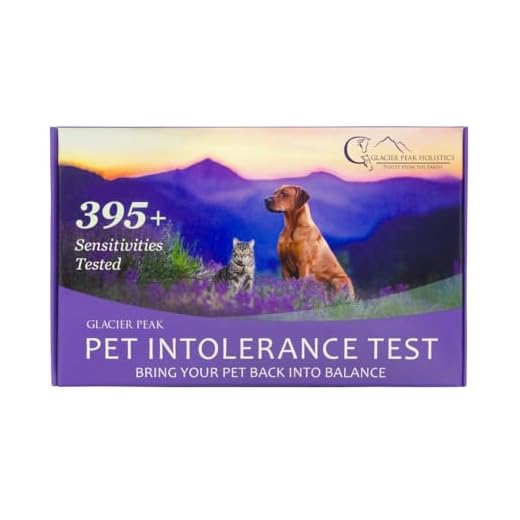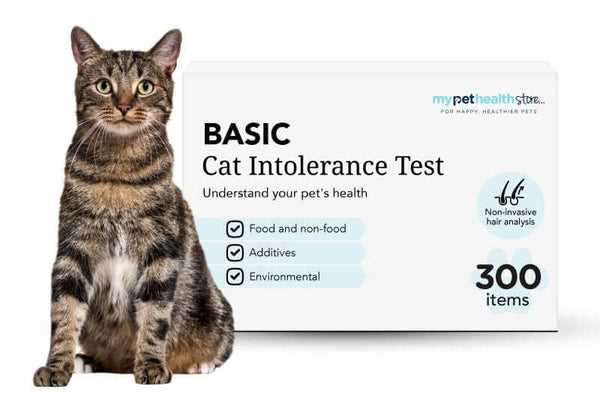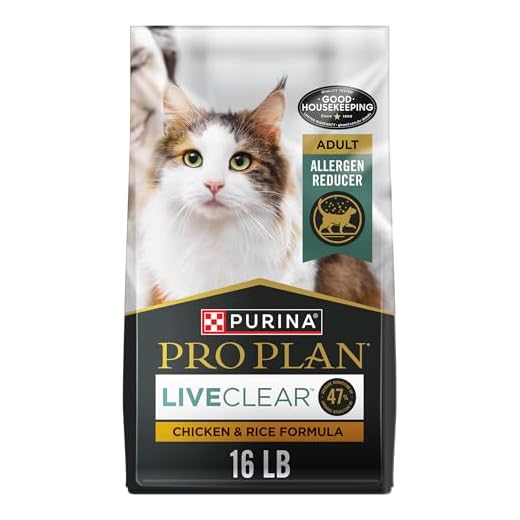




For those concerned about their feline companions’ health, understanding sensitivities is paramount. This article provides insights into the most reliable methods to identify specific triggers affecting your pet. By examining various approaches, you can make informed decisions that benefit your cat’s well-being.
Pet owners will find this information particularly useful if their cats exhibit symptoms such as itching, gastrointestinal issues, or respiratory problems. Knowing how to accurately assess these sensitivities can lead to better management and improved quality of life for your furry friend.
In the following sections, we will explore several popular diagnostic options, including skin tests, blood panels, and elimination diets. Each method has its advantages and limitations, making it essential to understand which approach aligns best with your cat’s needs and your lifestyle.
Best Allergy Testing Solutions for Felines
For identifying sensitivities in your feline companion, blood-based analysis stands out as a reliable method. It provides insights into specific proteins that trigger adverse reactions, allowing for a targeted approach to management.
Another approach involves skin examinations conducted by veterinarians. This method assesses immediate reactions to potential irritants, offering a clear picture of environmental factors affecting your pet.
Methods of Evaluation
Understanding the various evaluation methods can help in selecting the most suitable option for your furry friend:
-
Blood Analysis:
Involves a simple blood draw to measure antibodies related to specific triggers. Results typically indicate the severity of reactions.
-
Skin Prick Test:
Utilizes small pricks on the skin with potential allergens to observe immediate responses. This technique is often performed in veterinary clinics.
-
Elimination Diet:
Involves feeding a novel protein source for a period to identify food-related sensitivities. Gradual reintroduction of other ingredients helps pinpoint problem foods.
Consider discussing with your veterinarian to determine which method aligns with your pet’s specific needs. This collaboration can yield the most accurate insights into managing sensitivities.
Regardless of the chosen evaluation, following up with appropriate management strategies is crucial. These may include dietary adjustments, environmental modifications, or specific treatments tailored to your cat’s unique sensitivities.
Understanding Common Cat Allergies
Recognizing the signs of sensitivity in felines is crucial for effective management. Symptoms can manifest as skin irritations, gastrointestinal issues, or respiratory problems. Observing these reactions closely aids in identifying potential triggers.
Common irritants include environmental factors, food components, and parasites. Each type can lead to distinct reactions, making it essential for pet owners to monitor their pets’ health and behavior.
Common Triggers
- Pollen: Seasonal changes can bring about an increase in airborne pollen, leading to sneezing, itching, and other respiratory symptoms.
- Dust Mites: These microscopic creatures thrive in household environments, often contributing to skin and respiratory discomfort.
- Food Ingredients: Certain proteins or additives in commercial pet food may provoke gastrointestinal disturbances or skin reactions.
- Fleas: Flea bites can cause significant irritation and allergic responses, prompting excessive scratching and discomfort.
Identifying the source of discomfort often requires careful observation and, in some cases, consultation with a veterinarian. Keeping a detailed record of symptoms, diet, and environment can aid in pinpointing allergens.
Various methods exist to diagnose sensitivities, including elimination diets and skin tests. Understanding these processes can empower pet owners to make informed decisions regarding their pet’s care.
Types of Allergy Tests Available for Felines
Various methods exist to identify sensitivities in felines. The choice of approach can significantly impact the accuracy of the findings and inform subsequent treatment strategies.
Two primary categories of evaluations are commonly utilized: serum testing and intradermal testing. Each method has unique benefits and limitations, making it crucial to understand both options.
Serum Testing
Serum analysis involves collecting a blood sample from the feline. This sample is then examined for antibodies that react to specific allergens. It can identify a broad spectrum of triggers, including environmental factors and food components. However, the results may sometimes yield false positives, necessitating further confirmation.
Intradermal Testing
This method entails injecting small amounts of potential allergens into the skin. The veterinarian observes the reaction at the injection site, allowing for a direct assessment of sensitivity. This approach often delivers more precise results but may require sedation for some animals, depending on their temperament.
Comparative Overview
| Method | Sample Type | Accuracy | Invasiveness |
|---|---|---|---|
| Serum Analysis | Blood Sample | Variable | Minimally Invasive |
| Intradermal Testing | Skin Injection | Higher | More Invasive |
Choosing the right evaluation method depends on various factors, including the feline’s health status, age, and the veterinarian’s recommendations. Consulting with a veterinary professional is essential to determine the most suitable approach for identifying sensitivities.
How to Choose the Right Allergy Test for Your Cat
Selecting an appropriate method to identify sensitivities in your feline companion is a significant step in ensuring their well-being. Begin by consulting with a veterinarian who can provide guidance based on your cat’s specific symptoms and health history.
It is essential to consider the type of analysis you wish to pursue. Various approaches, such as blood analysis, skin prick methods, or intradermal examinations, have different levels of accuracy and may yield varying results. Each technique has its strengths and weaknesses, so understanding these can aid in making an informed choice.
Factors to Consider
- Veterinary Recommendations: Your veterinarian’s expertise is invaluable. They can recommend suitable examinations based on your cat’s health profile.
- Type of Reaction: Determine the symptoms exhibited by your cat. This can help narrow down the most effective method for analysis.
- Cost and Accessibility: Evaluate the financial implications and availability of different services in your area. Some methods may be more affordable or easier to access than others.
Additionally, reviewing the laboratory’s reputation where the analysis will be conducted can provide insights into their reliability. Look for facilities that have positive reviews and a history of accurate results.
Lastly, consider the follow-up process after testing. Understanding how the results will be interpreted and what steps will be taken next is crucial for managing your cat’s health effectively.
Evaluating the Accuracy of Allergy Testing Methods
To determine the reliability of methods for identifying sensitivities in felines, it’s essential to analyze both the procedures and their outcomes. Various techniques exist, each with distinct advantages and limitations that can influence results significantly.
Serological testing, which measures specific antibodies in the bloodstream, is a common approach. While it offers a non-invasive option, false positives and negatives can occur, leading to potential misdiagnosis. Skin testing, on the other hand, provides immediate responses by exposing the skin to allergens, but it requires skilled administration and interpretation.
Factors Influencing Test Accuracy
Several elements impact the precision of these diagnostic methods:
- Timing: The stage of an animal’s condition can affect results, as some sensitivities may fluctuate based on environmental exposures.
- Sample Quality: The integrity of blood or skin samples is critical; improper handling can lead to inaccurate findings.
- Veterinary Expertise: Experienced practitioners are better equipped to interpret results and recommend appropriate follow-up actions.
Furthermore, combining different methods may enhance diagnostic accuracy. For instance, correlating serological results with clinical symptoms can provide a more comprehensive understanding of an animal’s sensitivities.
In conclusion, careful evaluation of testing methods and their context is paramount. Selecting the right approach requires thorough consideration of individual circumstances and consultation with a knowledgeable veterinary professional.
Interpreting Test Results and Next Steps for Treatment
Upon receiving the results from the examination of sensitivities, it is critical to analyze the findings carefully. The results typically indicate specific allergens that may be causing reactions in your feline companion, categorized into environmental, food-related, or contact allergens. Understanding this classification aids in formulating an effective management plan.
Following interpretation of the results, the next steps involve addressing identified triggers. This may include a combination of environmental management, dietary adjustments, and possibly immunotherapy. Consult with a veterinarian to determine the most suitable course of action tailored to your pet’s needs.
Management Strategies
- Environmental Control: Regular cleaning to reduce dust and dander, using air purifiers, and minimizing exposure to pollen and mold.
- Dietary Changes: Implementing a hypoallergenic diet if food-related sensitivities are noted, ensuring a gradual transition to avoid digestive upset.
- Immunotherapy: Discussing options for allergy shots or drops designed to desensitize your pet to specific allergens over time.
Close monitoring of your feline’s response to any changes is essential. Documenting any improvements or setbacks aids in refining your approach and discussing further treatment with your veterinarian.
In summary, a thorough understanding of your pet’s sensitivities provides the foundation for developing an effective management plan. Collaborating with a veterinary professional ensures that your feline receives personalized care to enhance their quality of life.
Best allergy test for cats
Features
| Part Number | UP01 |
| Model | UPKD-10 |
| Size | Elite |
Features
| Color | 255 Food Intolerance Test |
| Is Adult Product | |
| Size | 1 Count (Pack of 1) |
Features
| Is Adult Product |
Features
| Warranty | Free kit provided if sample arrives damaged |
Features
| Part Number | sample_sku_1806 |
Features
| Part Number | 038100186034 |
| Model | 00038100186034 |
| Color | Other |
| Release Date | 2022-03-25T00:00:01Z |
| Size | 16 Pound (Pack of 1) |
Video:
FAQ:
What are the most common allergy tests for cats?
The most common allergy tests for cats include skin tests and blood tests. Skin tests involve injecting small amounts of allergens into the skin to observe reactions, while blood tests measure the level of specific antibodies produced in response to allergens. Each type has its advantages, and the choice may depend on the cat’s health, the vet’s recommendation, and the allergens suspected.
How do I know if my cat needs an allergy test?
If your cat shows signs of allergies such as itching, sneezing, watery eyes, or gastrointestinal issues, it may be time to consult a veterinarian. They will assess your cat’s symptoms and history to determine whether an allergy test is appropriate. Persistent or severe symptoms are particularly good indicators that testing may be beneficial.
Are allergy tests for cats safe?
Yes, allergy tests for cats are generally considered safe. Blood tests are non-invasive and carry minimal risk. Skin tests, while safe, involve injecting allergens, which can cause temporary discomfort or mild reactions. It’s important to have these tests conducted by a qualified veterinarian who can monitor your cat during the process.
How accurate are allergy tests for cats?
The accuracy of allergy tests can vary. Blood tests may have a lower sensitivity than skin tests, meaning they can sometimes produce false negatives. Skin tests are often considered more reliable for identifying immediate allergic reactions. However, no test is perfect, and a veterinarian may recommend additional observations or tests to confirm allergies.
What should I expect after my cat’s allergy test?
After an allergy test, your veterinarian will discuss the results with you. If allergens are identified, they may recommend a treatment plan, which could include dietary changes, medication, or allergy shots. It’s important to monitor your cat’s response to any new treatments and report any changes to your vet for further guidance.










